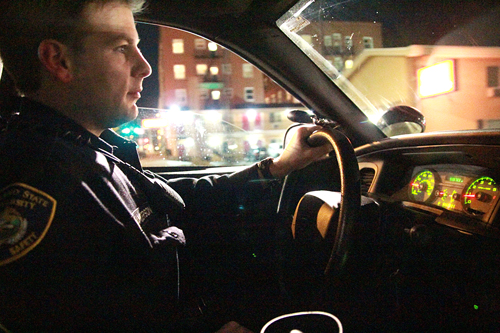Sergeant Michael Anderson pulled up in front of Smith Memorial Student Union and hopped out of his cruiser. Going inside, he snaked through the building, on the lookout for violators or trespassers. He stopped in front of a restroom, a location specifically targeted by Campus Public Safety because it’s frequented by heroin users. Anderson laughed and said, “I didn’t know this would be my life, waiting outside of restrooms.”
A twilight ride with CPSO

Sergeant Michael Anderson pulled up in front of Smith Memorial Student Union and hopped out of his cruiser. Going inside, he snaked through the building, on the lookout for violators or trespassers. He stopped in front of a restroom, a location specifically targeted by Campus Public Safety because it’s frequented by heroin users. Anderson laughed and said, “I didn’t know this would be my life, waiting outside of restrooms.”
Patrolling is just one of the officer’s duties. Aside from conducting building checks, officers escort students across campus and are responsible for locking and securing buildings after the university closes. But, while the university has expanded, CPSO resources have remained relatively the same. “The number of sworn security officers at CPSO is roughly the same as in 1976,” said CPSO Director Phillip Zerzan.
The restroom is occupied. Anderson remained outside until the occupant exited, explaining the problems of heroin use at the university. Usually, he said, the spaces targeted by users are unisex bathrooms that can be locked. Additionally, users target spaces that are easy to enter and exit without notice—like this particular restroom on the second-floor mezzanine of SMSU right across from the offices of Student Activities and Leadership Programs advisers. According to Anderson, an arrest was made there the day before this ride-along.
Tana Atchley, SALP advisor for political and multicultural groups, said the restroom has been an issue. “I’ve been in this office space for six years, and I’ve noticed it’s a problem,” Atchley said. “Students have reported seeing needles on the toilet seats.” Additionally, according to Atchley, during the early morning hours, people are often found sleeping in the restrooms.
After checking the restroom, Anderson went up to the third floor then down to the basement, back up to the fourth floor and into the Queer Resource Center in the north stairwell. Anderson often checks in with the center on the status of students who experienced emotional trauma or who have committed acts of violence against themselves. “We’ve had emergencies where we’ve had to come to the center,” Anderson said.
Other high traffic restrooms for heroin use include the basement annex of Ondine Housing and near the Distance Learning Center on the second floor of the Urban Center Building. Another hotspot for heroin use is the Science Building 1 mezzanine area. “In December of 2010 there was an overdose leading to a fatality, after which the university put locks on the doors,” Anderson said. Now coded locks that restrict access make those areas more secure.
Anderson exited SMSU and continued onto the Ondine and Urban Center buildings. As he inspected the area around the Distance Learning Center, he recalled a confrontation that happened during fall term between himself, another officer and a suspect. Anderson and Officer Denae Murphy were checking the area when a man emerged from a high-traffic restroom. They asked to see his identification, but he refused. The situation quickly escalated.
“He threw Officer Murphy onto the stairs and threw me into a door,” Anderson said. Murphy and Anderson were forced to subdue the man themselves until Portland Police Bureau arrived to assist. Investigation of the man revealed he had no previous arrests or warrants and was not in possession of any drugs or illegal substances.
Recently, CPSO has seen increased car break-ins at on-campus parking structures. In response, CPSO and parking enforcement have increased their patrols of the structures. As Anderson cruised through the levels of Parking Structure 1, he explained that the first levels are often more popular due to the ease of access.
Not finding anything out of the ordinary, Anderson then cruised over to Parking Structure 3, where he saw a vehicle missing its rear window, an object dangling from the space. Anderson recognized the vehicle as one that had previously been broken into, but he still ran the plates and investigated the scene. No objects were missing from the vehicle and there were no signs of forced entry.
“Parking Structure 3 was part of a stolen-car dumping circuit for many years,” Anderson explained. “Sometimes the stolen cars would be found with multiple citations,” he added. The problem was addressed, Anderson explained, and CPSO noticed a drop in the discovery of stolen vehicles. Not many have been seen there since.
As the sun began to set, Anderson began another one of his duties on campus: locking and securing buildings. The University Center Building was the first stop. Previously, CPSO had officers specifically assigned to secure buildings and to serve as escorts for students. Now, CPSO has distributed those responsibilities amongst the entire patrol staff in order to expand the number of patrol officers. Anderson secured the building before returning to the office to respond to a call.
The call sent him back to the science buildings. A male doctoral-chemistry student had trouble securing the lock on a lab door. Anderson, who at this point was one of the only officers on duty, called in facilities and maintenance to repair the broken lock. He told the student to remain in the lab until help arrived.
In a mere four hours, Anderson completed all the university building checks. He returned to his office to complete the administrative duties that come with his new leadership position. Soon, the evening shift would arrive and the cycle would start over again.





